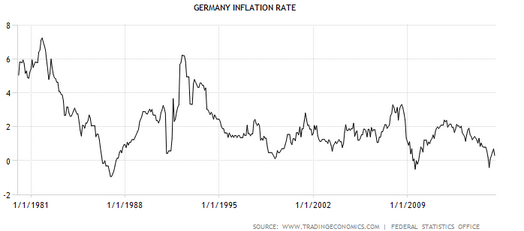The past week it’s been open season on Germany. Even I have occasionally bashed them for their views on monetary policy. In a way this is odd, because in many respects Germany has been (since 1945) almost like a model country. Other countries should try to be more like Germany. It’s also odd because Germany’s views are completely typical of the eurozone–so why single out that one country? Yes, France and Italy are a bit more moderate, but the other 15 are just as upset with Greece as is Germany.
Ben Bernanke recently made some comments on Germany and the eurozone:
Since the global financial crisis, economic outcomes in the euro zone have been deeply disappointing. The failure of European economic policy has two, closely related, aspects: (1) the weak performance of the euro zone as a whole; and (2) the highly asymmetric outcomes among countries within the euro zone. The poor overall performance is illustrated by Figure 1 below, which shows the euro area unemployment rate since 2007, with the U.S. unemployment rate shown for comparison. . . .
In late 2009 and early 2010 unemployment rates in Europe and the United States were roughly equal, at about 10 percent of the labor force. Today the unemployment rate in the United States is 5.3 percent, while the unemployment rate in the euro zone is more than 11 percent. . . .
The slow recovery from the crisis of the euro zone as a whole is the result, among other factors, of (1) political resistance that delayed by many years the implementation of sufficiently aggressive monetary policies by the European Central Bank; (2) excessively tight fiscal policies, especially in countries like Germany that have some amount of “fiscal space” and thus no immediate need to tighten their belts; and (3) delays in taking the necessary steps, analogous to the banking “stress tests” in the United States in the spring of 2009, to restore confidence in the banking system.
So far this is very similar to my views, except the part about fiscal policy. But here’s where Bernanke loses me:
What about the strength of the German economy (and a few others) relative to the rest of the euro zone, as illustrated by Figure 2? As I discussed in an earlier post, Germany has benefited from having a currency, the euro, with an international value that is significantly weaker than a hypothetical German-only currency would be. Germany’s membership in the euro area has thus proved a major boost to German exports, relative to what they would be with an independent currency.
I see this argument a lot, but it makes no sense on either theoretical or empirical grounds. Over at Econlog I have a post showing that northern European countries not in the euro have just as big current account surpluses as Germany. And by the way, even on theoretical grounds joining the euro should not matter at all, if Europe had previously had a fixed exchange rate system. So I’ll give Bernanke the benefit of the doubt and assume that it’s the fixed exchange rate regime that he thinks actually benefits Germany, not the euro itself. Let’s also put aside the question of why Bernanke thinks a current account surplus “benefits” a country—that’s not standard economics. Indeed by that logic Australia would be suffering from its large chronic CA deficits. The CA surplus is simply domestic saving minus domestic investment; it’s not clear why we should care about it.
There is one way to test Bernanke’s claim. A country with an undervalued currency will see its real exchange rate appreciate through inflation. Recall that in the long run monetary policy only affects the nominal exchange rate, the real exchange rate is determined by the fundamentals driving saving and investment.
The counterargument is that prices are sticky, and hence it may take a while for the real exchange rate to reach equilibrium. Yes, but even so, if this were occurring then you’d see high inflation in Germany during the adjustment process. Here’s the actual inflation rate in Germany:

It seems to me that Bernanke’s claim might apply to the early 1990s. At that time Germany was booming, partly due to the rebuilding involved with re-unification, and the ERM tied Germany to weaker economies like Britain and Sweden. At that time, the DM was undervalued, and instead of a rise in the nominal exchange rate (prevented by the ERM), inflation rose sharply higher, raising the real exchange rate.
Today German inflation is merely 0.3%, not what you’d expect if the euro were undervalued in Germany. Indeed I see little evidence of an undervalued currency in Germany since 1995. Let’s review:
1. Bernanke’s claim is not consistent with mainstream macro theory, at least in the long run.
2. Bernanke’s claim is not consistent with the fact that other northern European countries that still have their own currencies also have huge CA surpluses. Why wouldn’t a Germany with the DM be like Sweden and Switzerland? (I leave out Norway, whose CA surplus may be bolstered by oil.)
3. And Bernanke’s claim is not consistent with the very low and falling inflation rate in Germany. If the euro were undervalued in Germany, inflation would be high and rising.


